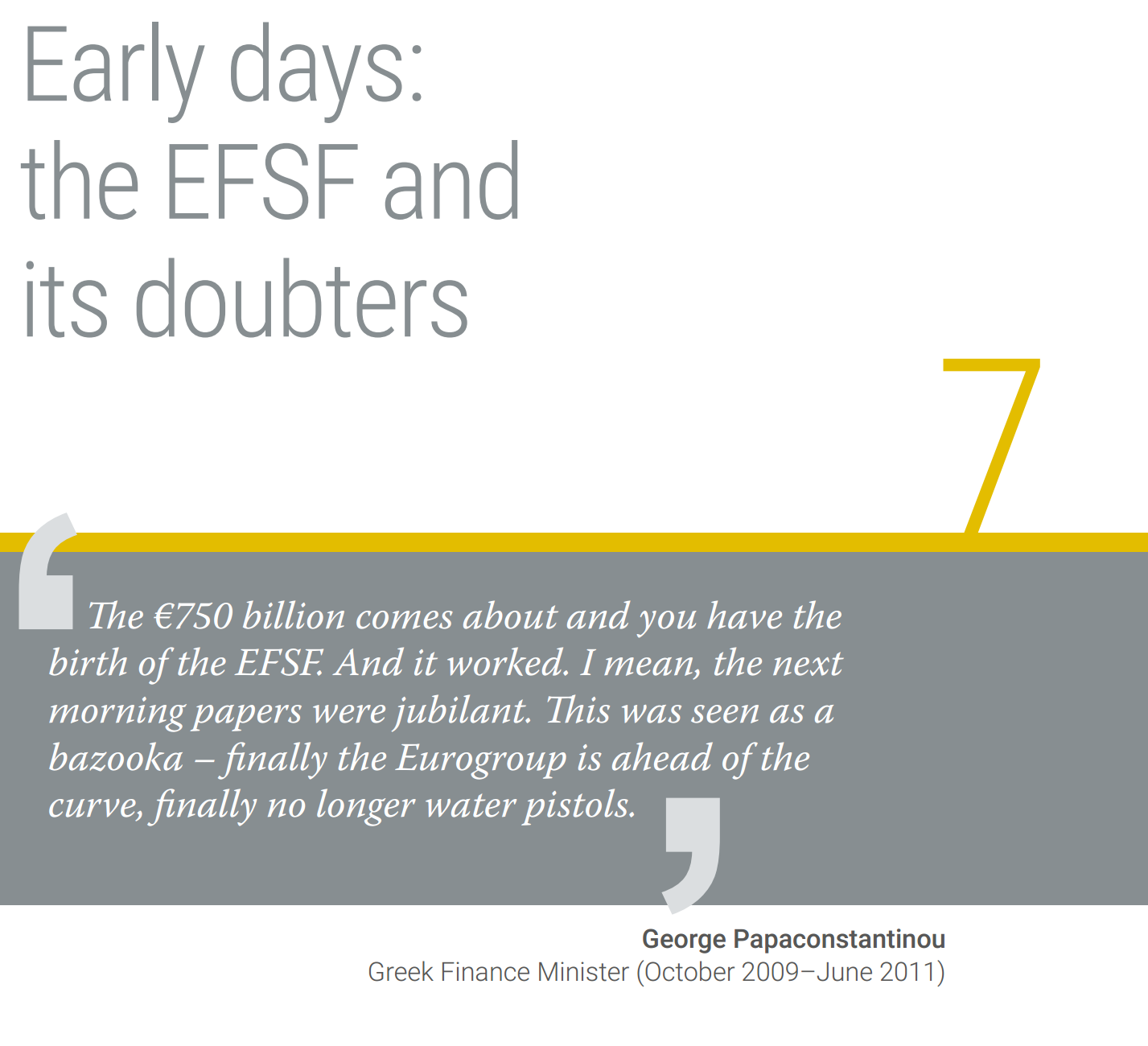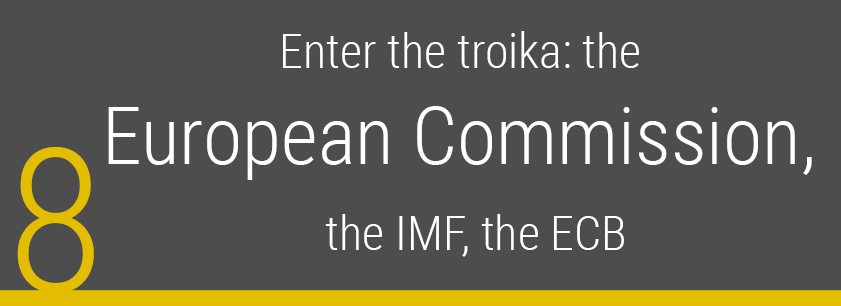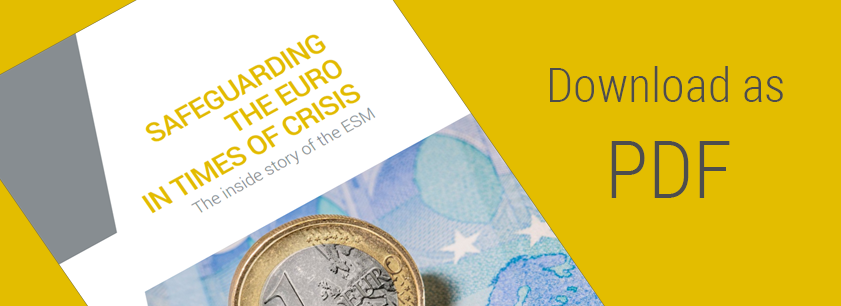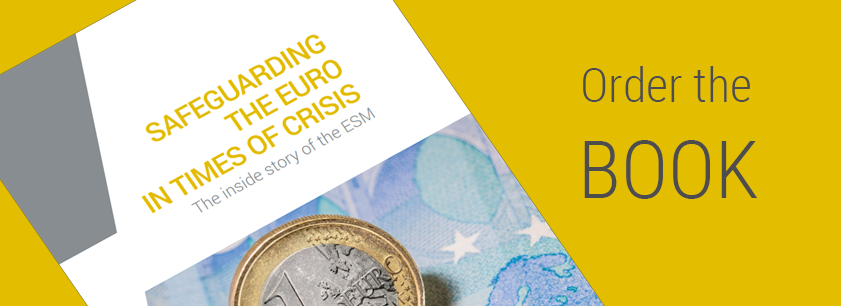
Outside Europe, the establishment of the rescue fund was seen as a key turning point. In late June 2010, leaders from the Group of 20 major industrialised countries met in Toronto to take stock of the global economic outlook. The group, which comprises 20 of the biggest economies in the world, classified the creation of the EFSF, the European Financial Stabilisation Mechanism, as well as the stress testing of EU banks, as ‘substantial contributions to our collective well-being’[1].
But inside the EU the firewall had critics. For some countries, the very existence of a crisis-fighting mechanism created the risk that politicians might rely on it, instead of facing up to hard choices at home. It would take time for detractors to build trust in this new instrument – even though no one saw an immediate alternative to the temporary firewall.
For countries in economic distress, the EFSF’s chief downside was that the granting of financial aid was by unanimity, a requirement that could frustrate quick decision-making, or block any decision-making at all. For better-off countries that would underwrite rescue programmes, the fund was unthinkable without this veto power.
As the economically weightiest euro area member state, Germany was often seen at the forefront of an alliance of countries seeking to limit the use of the new firewall. From the outset, one of Regling’s biggest tasks as EFSF chief executive would be to bridge the gap between public sentiment in the north and in the south, making sure the rescue fund was attuned to the needs of all of its stakeholders.
‘Often it was not Germany alone; it was a group of five or six countries,’ Regling said. ‘Another 12 countries wanted to be more generous. That’s our situation. We cannot say that one half of our members are right and the others are wrong.’
Scepticism had its roots in the EU Treaty, which prohibits the assumption of an afflicted country’s debts by another country or by the EU[2]. This no-bailout clause put each country in charge of its financial fate, and the stability and growth pact prevented countries from amassing destabilising debts – or so the theory went. It took time, and the experience of cross-border market turmoil, for European public opinion to warm to the notion of collective responsibility for monetary union.
‘That is why it was so difficult,’ said Verwey, a senior Commission official who had been one of the EFSF’s main architects. ‘That had been the story in the Netherlands and Germany for a long time: “We have the no-bailout clause and the stability and growth pact, so a crisis just won’t happen.”’
The EFSF’s untried legal basis didn’t help matters. Legal challenges to the rescue fund would be filed – and eventually defeated – in Germany, Estonia, and Ireland.
Owing to the political sensitivities, the EFSF came into being with an unspoken understanding that it wouldn’t be called upon, at least in the short term. Strauch, its chief economist, said the new institution was part of an EU-wide learning process. ‘From a Dutch, Finnish, or German point of view, it needed to be crystal clear at that point in time that rescue loans could only be used as a very last resort,’ Strauch said. ‘Giving easier access would have been impossible to sell politically and subject to legal challenge in parts of northern Europe.’
These built-in restrictions posed a dilemma for crisis management. Without them, there would be no EFSF; but with them, there was a risk that aid would be delayed or denied. Buti, the Commission’s director-general for economic and financial affairs, said this hamstrung the euro area’s ability to get ahead of the contagion. Financial rescues, he said, would be mounted only as an ‘ultima ratio’ ‘to collectively make unprecedented decisions and cross no-go lines only in those types of conditions where you are backed against the wall and there is no way to go back.’
It was a costly trade-off, as the next set of rescue programmes would show. ‘It meant procrastinating until you were staring into the abyss,’ Buti said.
To move forward, the EFSF would need approval from all euro area governments. Some countries saw an immediate benefit in preparing a common defence against future market disruption. Although Malta wasn’t directly in the line of fire, it felt a sense of urgency about the looming crisis, said Camilleri, permanent secretary for budget and finance in the Maltese finance ministry.
‘We are a very small, open economy. Whatever happens elsewhere is bound to hit us,’ Camilleri said. ‘It was not perceived as somebody else’s problem. If there is a problem, it’s also our problem.’
As the crisis rippled through Europe, political alignments started to shift in the more financially solid countries. Anti-bailout movements emerged in Germany, in Finland, and elsewhere. The electoral consequences were first felt in Slovakia, which having joined in 2009 was then the euro area’s newest member – and its poorest, with real per capita GDP of €11,900, compared with €21,500 for Greece[3].
Slovakia had done its homework to adopt the euro, imposing discipline on its public accounts and posting a debt-to-GDP ratio of 36.3% in 2009[4], well below the euro area average of 78.5%. These fiscal exertions coloured Slovaks’ attitudes towards contributing to what they saw as the high cost of rescuing a wealthier country whose own irresponsible fiscal behaviour had led to its crisis.
Slovak voters picked a centre-right governing coalition in June 2010 elections. Iveta Radičová, a critic of financial assistance for Greece, became prime minister. Radičová’s government sought to balance EU and domestic pressures by positioning itself as a champion of reform, pushing for a tough stance against countries that break the debt and deficit rules underpinning the euro.
Under the EFSF’s original design, Slovakia’s share of the guarantees for the temporary firewall was around €4.4 billion, on top of the €816 million it had been asked to make available to Greece as part of the Greek Loan Facility[5]. In Bratislava, the twin commitments weren’t politically reconcilable. Slovakia decided that its precondition for approving the EFSF was to pull out of the bilateral loan framework.
On 15 July, Radičová’s government ratified the creation of the EFSF as one of the last countries to do so, while declining to take part in the bilateral Greek programme. The price it exacted for endorsing the rescue fund foreshadowed bigger fights as the crisis deepened and the euro area was forced to increase its response capacity.
For Rehn, then the European commissioner for economic and monetary affairs and the euro, Slovakia’s refusal to extend loans to Greece constituted ‘a breach of solidarity,’ he stated at the time[6]. The move wouldn’t hamper disbursements of Greece’s loan package, but he said it undermined ‘a crucial act at a critical moment to safeguard financial stability of the euro area as a whole, including Slovakia.’
Even as they managed to create innovative solutions to the crisis, the episode showed how trust among European countries was fraying.
7. Early days: the EFSF and its doubters
Continue reading
[1] The G-20 Toronto Summit Declaration, 26 and 27 June 2010, Paris. https://www.oecd.org/g20/summits/toronto/g20-declaration.pdf
[2] Treaty of Lisbon amending the Treaty on European Union and the Treaty establishing the European Community, OJ C306/1, 17 December 2007, Article 125, https://eur-lex.europa.eu/legal-content/EN/TXT/?uri=celex%3A12007L%2FTXT
[3] Eurostat (2019), ‘GDP and main aggregates – selected international annual data’. http://appsso.eurostat.ec.europa.eu/nui/show.do?dataset=naida_10_gdp&lang=en
[4] Eurostat (n.d.), ‘General government gross debt – % of GDP and million EUR’. https://ec.europa.eu/eurostat/tgm/table.do?tab=table&init=1&language=en&pcode=sdg_17_40&plugin=1
[5] Euobserver (2010), ‘Brussels rebukes Slovakia over Greek u-turn’, 12 August 2010. https://euobserver.com/economic/30610
[6] European Commission (2010), ‘Statement by Commissioner Olli Rehn on today’s vote by Slovakia’s Parliament rejecting the participation in the loan for Greece’, 11 August 2010. http://europa.eu/rapid/press-release_MEMO-10-368_en.htm


